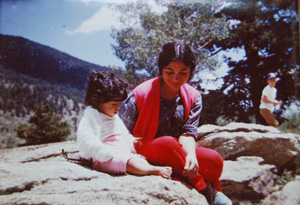What Mothers Really Want

Another Mother's Day has passed, but environmental journalist Simran Sethi says that's no reason to forget about what moms—and especially Mother Earth—really need from us.
In the shadow of Mother's Day, I have been thinking about my mother (pictured here, with me as a child) and asking myself, "What do mothers really want?" Chocolate, flowers, jewelry, homemade pancakes, cards adorned with glitter and macaroni—all sweet ways to honor the woman who took care of you and made you the person you are today. But is that enough?Women assume about twice the amount of housework that men do. And, regardless of their employment status, women are the default caregivers of children. According to the Bureau of Labor Statistics, on weekdays women spend an average of 1.2 hours bathing and feeding young kids while men spend about 25 minutes doing the same. This is in addition to the 2.6 hours (that may or may not come on top of work completed outside of the home) women spend cooking, cleaning and doing other household chores. Women's work done within the home is largely unpaid and, unfortunately, under-recognized. Hours spent coaxing vegetables into reluctant mouths, healing boo-boos and checking for dragons underneath beds and in closets aren't logged on time sheets or tallied in our gross domestic product, or GDP—the value of all the goods and services created within a country.
GDP is one of the main economic indicators used to assess the health of our economy, but it is grossly incomplete. It accounts for housework and childcare only when we pay for it—much in the way GDP ignores the value of natural resources until we turn them into commodities, or have to pay to clean them up like the Deepwater Horizon Disaster off the coast of Louisiana. GDP goes up when we get sick and have to pay money to a doctor, but it doesn't budge when we are well. And GDP doesn't distinguish between the money we spend to put someone in jail versus the money we spend to put someone through college.
It's hard to gauge how well we're doing when we don't count what really counts, and it's hard to honor the value mothers (including Mother Earth) bring to us when we give them kudos only once a year. Considering all that moms do, I think the best way to honor their work is to give them a break.
What all mothers—including Mother Earth—want is rest.
When it comes to Mother Earth, we are in a state economist Donella Meadows defined in her seminal text Limits to Growth as "overshoot." The human population has exceeded the carrying capacity of our planet. For example, if everyone ate food, generated waste and used energy like we Americans do, we would need more than five planets to sustain us. Americans make up about 5 percent of the global population, but use 20 percent of the world's petroleum and about one-third of the world's paper.
As any sleep-deprived mother can tell you, rest is the way we rejuvenate and reconstitute ourselves. It is an essential part of how we take care of ourselves and can be an important way in which we give back to all the mothers who provide for us.
To that end, I am taking a two week-break to collect my thoughts and get ready for the massive kitchen overhaul. I'll cover ways we can all get clear and rested when I return.
Happy spring,
Simran
Simran Sethi is an award-winning journalist and associate professor at the University of Kansas School of Journalism and Mass Communications. For more information on Sethi, visit SimranSethi.com and follow her on Twitter @simransethi.
Keep Reading:
Raising a green baby starts with lead-free toys
How Life gave Oprah a second chance to love the planet
Earth-friendly fashion does good while looking great
As any sleep-deprived mother can tell you, rest is the way we rejuvenate and reconstitute ourselves. It is an essential part of how we take care of ourselves and can be an important way in which we give back to all the mothers who provide for us.
To that end, I am taking a two week-break to collect my thoughts and get ready for the massive kitchen overhaul. I'll cover ways we can all get clear and rested when I return.
Happy spring,
Simran
Simran Sethi is an award-winning journalist and associate professor at the University of Kansas School of Journalism and Mass Communications. For more information on Sethi, visit SimranSethi.com and follow her on Twitter @simransethi.
Keep Reading:
Raising a green baby starts with lead-free toys
How Life gave Oprah a second chance to love the planet
Earth-friendly fashion does good while looking great



